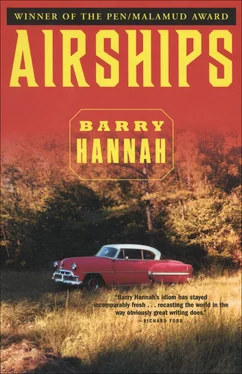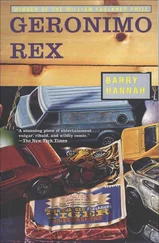“Why’re you in Nam, anyway?”
“I joined. I wasn’t getting anything done but being in love with my wife. That wasn’t doing America any good.”
“What’s that patch on you?”
“Photography.” He lifted his hands to hold an imaginary camera. “I’m with the Big Red. I’ve done a few things out of helicopters.”
“You want to see a ground unit? With me. Or does Big Red own you?”
“I have no idea. There hasn’t been much to shoot. Some smoking villages. A fire in a bamboo forest. I’d like to see a face.”
“You got any pictures of Vicksburg?”
“Oh, well, a few I brought over.”
The next day I found out he was doing idlework and Big Red didn’t care where he was, so I got him over in my unit. I worried about his weight, etc., and the fact he might be killed. But the boys liked a movie-cameraist being along and I wanted to see the pictures from Vicksburg. It was nice to have Tubby alongside. He was hometown, such as he was. Before we flew out north, he showed me what he had. There was a fine touch in his pictures. There was a cute little Negro on roller skates, and an old woman on a porch, a little boy sleeping in a speedboat with the river in the background. Then there was a blurred picture of his wife naked, just moving through the kitchen, nothing sexy. The last picture was the best. It was John Whitelaw about to crack a golf ball. Tubby had taken it at Augusta, at the Masters. I used to live about five houses away from the Whitelaws. John had his mouth open and his arms, the forearm muscles, were bulked up plain as wires.
John was ten years older than me, but I knew about him. John Whitelaw was our only celebrity since the Civil War. In the picture he wore spectacles. It struck me as something deep, brave, mighty and, well, modern; he had to have the eyeglasses on him to see the mighty thing he was about to do. Maybe I sympathized too much, since I have to wear glasses too, but I thought this picture was worthy of a statue. Tubby had taken it in a striking gray-and-white grain. John seemed to be hitting under a heroic deficiency. You could see the sweat droplets on his neck. His eyes were in an agony. But the thing that got me was that John Whitelaw cared so much about what he was doing. It made me love America to know he was in it, and I hadn’t loved anything for nigh three years then. Tubby was talking about all this “our country” eagle and stars mooky and had seen all the war movies coming over on the boat. I never saw a higher case of fresh and crazy in my life.
But the picture of John at Augusta, it moved me. It was a man at work and play at the same time, doing his damnedest. And Whitelaw was a beautiful man. They pass that term “beautiful” around like pennies nowadays, but I saw him in the flesh once. It was fall in Baton Rouge, around the campus of LSU. He was getting out of a car with a gypsyish girl on his hand. I was ten, I guess, and he was twenty. We were down for a ball game, Mississippi vs. Louisiana, a classic that makes you goo-goo eyed when you’re a full-grown man if your heart’s in Dixie, etc. At ten, it’s Ozville. So in the middle of it, this feeling, I saw Whitelaw and his woman. My dad stopped the car.
“Wasn’t that Johnny Whitelaw?” he asked my grandfather.
“You mean that little peacock who left football for golf? He ought to be quarterbacking Ole Miss right now. It wouldn’t be no contest,” said my grandfather.
I got my whole idea of what a woman should look like that day. . and what a man should be. The way John Whitelaw looked, it sort of rebuked yourself ever hoping to call yourself a man. The girl he was with woke up my clammy little dreams about, not even sex, but the perfect thing — it was something like her. As for Whitelaw, his face was curled around by that wild hair the color of beer; his chest was deep, just about to bust out of that collar and bow tie.
“That girl he had, she had a drink in her hand. You could hardly see her for her hair,” said my grandfather.
“Johnny got him something Cajun,” said my father.
Then my grandfather turned around, looking at me like I was a crab who could say a couple of words. “You look like your mother, but you got gray eyes. What’s wrong? You have to take a leak?”
Nothing was wrong with me. I’d just seen John Whitelaw and his girl, that was all.
Tubby had jumped a half-dozen times at Fort Bragg, but he had that heavy box harnessed on him now and I knew he was going down fast and better know how to hit. I explained to him. I went off the plane four behind him, cupping a joint. I didn’t want Tubby seeing me smoking grass, but it’s just about the only way to get down. If the Cong saw the plane, you’d fall into a barbecue. They’ve killed a whole unit before, using shotguns and flame bullets, just like your ducks floating in. You hear a lot of noise going in with a whole unit in the air like this. We start shooting about a hundred feet from ground. If you ever hear one bullet pass you, you get sick thinking there might be a lot of them. All you can do is point your gun down and shoot it all out. You can’t reload. You never hit anything. There’s a sharpshooter, Mclntire, who killed a C shooting from his chute, but that’s unlikely. They’ve got you like a gallery of rabbits if they’re down there.
I saw Tubby sinking fast over the wrong part of the field. I had two chutes out, so I cut one off and dropped over toward him, pulling on the left lines so hard I almost didn’t have a chute at all for a while. I got level with him and he looked over, pointing down. He was doing his arm up and down. Could have been farmers or just curious rubbernecks down in the field, but there were about ten of them grouped up together, holding things. They weren’t shooting, though. I was carrying an experimental gun, me and about ten of my boys. It was a big, light thing; really, it was just a launcher. There were five shells in it, bigger than shotgun shells. If you shot one of them, it was supposed to explode on impact and burn out everything in a twenty-five-yard radius. It was a mean little mother of phosphorus, is what it was. I saw the boys shooting them down into the other side of the field. This stuff would take down a whole tree and you’d chute into a quiet smoking bare area.
I don’t know. I don’t like a group waiting on me when I jump out of a plane. I almost zapped them, but they weren’t throwing anything up. Me and Tubby hit the ground about the same time. They were farmers. I talked to them. They said there were three Cong with them until we were about a hundred feet over. The Cong knew we had the phosphorus shotgun and showed ass, loping out to the woods fifty yards to the north when me and Tubby were coming in.
Tubby took some film of the farmers. All of them had thin chin beards and soft hands because their wives did most of the work. They essentially just lay around and were hung with philosophy, and actually were pretty happy. Nothing had happened around here till we jumped in. These were fresh people. I told them to get everybody out of the huts because we were going to have a thing in the field. It was a crisis point. A huge army of NVA was coming down and they just couldn’t avoid us if they wanted to have any run of the valley five miles south. We were there to harass the front point of the army, whatever it was like.
“We’re here to check their advance,” Tubby told the farmers.
Then we all collected in the woods, five hundred and fifty souls, scared out of mind. What we had going was we knew the NVA general bringing them down was not too bright. He went to the Sorbonne and we had this report from his professor: “Li Dap speaks French very well and had studied Napoleon before he got to me. He knows Robert Lee and the strategy of Jeb Stuart, whose daring circles around an immense army captured his mind. Li Dap wants to be Jeb Stuart. I cannot imagine him in command of more than five hundred troops.”
Читать дальше












